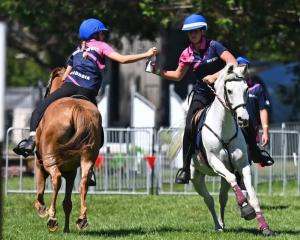A woman who claims to be the first western geisha has lost the latest round in a fight against her convictions and sentence in a long-running legal battle over the use of a Wanaka property.
Australian anthropologist Fiona Graham was convicted and fined in 2008 in Queenstown District Court for failing to meet fire standards on a building she had wanted to turn into low-budget tourist accommodation.
She and her company, Wanaka Gym, were ordered to pay fines totalling $64,000.
Graham appealed against the convictions and sentences.
In a High Court decision in February last year, Justice Christine French dismissed the appeals, saying Graham "has no remorse", and criticised her for her "stubborn refusal to accept that the safety of persons sleeping in the building was compromised".
Graham also lost a bid to appeal against that decision in the Court of Appeal.
Last November, Graham applied for special leave to the Court of Appeal to appeal against Justice French's decision.
Her lawyer, John Andrew told the court his client should have been discharged without conviction because it was out of proportion to the gravity of the offence and would have an impact on her career in Japan.
In a decision released today, Justices Ellen France, Rodney Hansen and Jillian Mellon acknowledged Graham's qualifications were "undoubtedly unique".
"She obtained a degree at Keio University and completed a doctorate in social anthropology at the University of Oxford.
"She undertook training to become a geisha. It was initially an academic project but she received permission to continue training, formally debuting as a geisha in December 2007."
She was reported to be the first Caucasian woman to work in the role, the judges said.
Mr Dean argued that Justice French did not turn her mind to the direct and indirect consequences of a conviction for Graham's career, in particular her unique status as the first western geisha and her academic career in the field of social anthropology.
The judge's noted that Justice French had acknowledged that Graham was the "world's foremost expert" in her field.
"...she commented that, if her international standing and contribution to Japanese society is as significant as is being claimed, the risk of non-renewal of her visa would be mitigated."
The judges said that apart from difficulties in in obtaining a visa or permanent residency in Japan, there was no evidence that convictions would jeopardise Graham's career as a geisha or as a social anthropologist.
They dismissed her application for special leave to appeal against the High Court decision.












